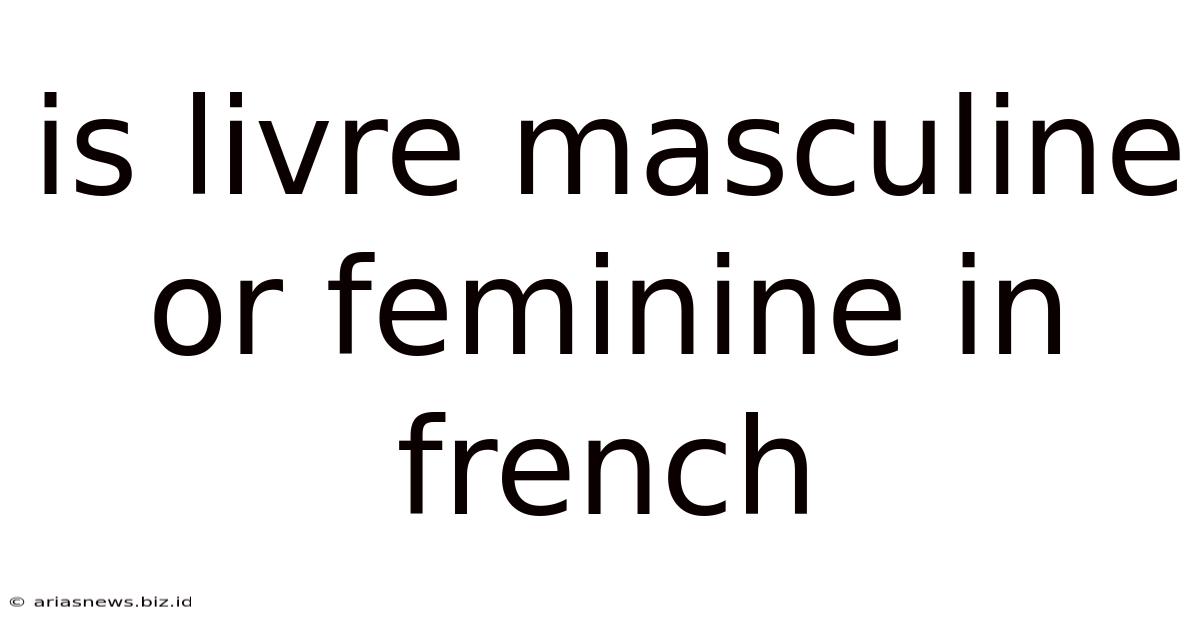Is Livre Masculine Or Feminine In French
Arias News
May 12, 2025 · 4 min read

Table of Contents
Is "Livre" Masculine or Feminine in French? A Deep Dive into Gendered Nouns
The French language, renowned for its elegance and complexity, presents a unique challenge to learners: grammatical gender. Unlike English, where nouns don't inherently possess gender, French nouns are either masculine or feminine, influencing the agreement of articles, adjectives, and pronouns. This article delves into the seemingly simple, yet surprisingly nuanced, question: is "livre" masculine or feminine? We'll explore the intricacies of French noun gender, examining the rules (and exceptions!), and providing you with the tools to confidently navigate this grammatical hurdle.
Understanding Gender in French
Before tackling "livre," let's establish a foundational understanding of gender in French. While seemingly arbitrary, the gender assigned to a noun isn't entirely random. Certain suffixes and word origins often correlate with specific genders, though countless exceptions exist. This is where memorization and practice become crucial.
Masculine Nouns
Masculine nouns are typically preceded by the definite article "le" (the) or "les" (the, plural) and often end in consonants or certain suffixes like "-eur," "-ment," "-age," and "-isme." However, this isn't a steadfast rule. Many masculine nouns defy these patterns, highlighting the importance of learning each noun's gender individually.
Feminine Nouns
Feminine nouns generally take "la" (the) or "les" (the, plural) and frequently end in "-e," "-ion," "-tion," "-sion," "-ance," "-ence," and "-té." Again, these are tendencies, not guarantees. The unpredictable nature of gender makes rote memorization a significant part of mastering French grammar.
The Case of "Livre": Book or Pound?
The word "livre" in French holds a fascinating duality. It can refer to two distinct things:
- A book: This is the most common meaning, and this is where the grammatical gender becomes crucial.
- A pound (unit of weight): This usage is less frequent in modern French.
The answer to the main question is: "Livre" (meaning "book") is masculine. This means you would use "le livre" (the book), "un livre" (a book), "des livres" (some books), and so forth. The masculine agreement extends to adjectives modifying "livre," which must also be in the masculine form.
However, the gender shifts when considering "livre" as a unit of weight. While less common, "livre" (meaning "pound") is feminine. It's an archaic term mostly used in historical contexts or specialized fields. In this case, you would use "la livre" (the pound).
This dual gender underscores the importance of context in understanding the grammatical function of a word. Always consider the meaning intended before assigning gender.
Strategies for Mastering Noun Gender
Learning French noun genders can feel overwhelming, but several strategies can streamline the process:
1. Memorization and Flashcards:
This is arguably the most effective approach. Create flashcards with the noun on one side and its gender and a sample sentence on the other. Regularly reviewing these cards reinforces memory.
2. Pattern Recognition:
While exceptions abound, identifying common patterns in noun endings can help predict gender. However, be wary of over-reliance on these patterns; always verify the gender with a reliable source.
3. Contextual Clues:
Pay close attention to the articles and adjectives used with the noun. If the article is "le" or "un," the noun is likely masculine. If it's "la" or "une," it's probably feminine.
4. Utilizing Resources:
French dictionaries and grammar textbooks consistently provide gender information for nouns. Use these resources to confirm your understanding and expand your vocabulary.
5. Immersion:
Surrounding yourself with the French language—through reading, listening to music, watching films, and interacting with native speakers—naturally exposes you to correct gender usage. This contextual learning aids long-term retention.
Beyond "Livre": Further Examples of Gendered Nouns
Let's explore additional examples to solidify your understanding of French noun genders:
Masculine Nouns:
- Le chat: The cat
- Le chien: The dog
- Le garçon: The boy
- Le tableau: The painting
- Le journal: The newspaper
- Le soleil: The sun
- Le problème: The problem
Feminine Nouns:
- La chatte: The female cat
- La chienne: The female dog
- La fille: The girl
- La voiture: The car
- La maison: The house
- La lune: The moon
- La solution: The solution
Notice the inconsistencies. While many feminine nouns end in "-e," many masculine nouns do not follow a consistent pattern.
Advanced Considerations: Exceptions and Irregularities
The French language is full of exceptions. Be prepared to encounter words that defy the typical gender patterns. Some words have multiple meanings, each with a different gender. For instance, the word "tour" can be masculine ("the tower") or feminine ("the turn"). Context is key in deciphering such complexities.
Moreover, some nouns have genders that seem counterintuitive. Learning these exceptions through consistent exposure and practice is essential for achieving fluency.
Conclusion: Mastering the Gender Game
While mastering the intricacies of French noun genders requires dedication and consistent effort, it's a rewarding journey. Understanding the gender of "livre," and other nouns, is crucial for constructing grammatically correct sentences and achieving fluency. By employing the strategies outlined above, you can confidently navigate the complexities of gender in French, paving your way to improved communication and a deeper appreciation for this beautiful language. Remember that regular practice and immersion are key to solidifying your knowledge and building confidence in using French grammar accurately. The seemingly arbitrary nature of French noun genders will eventually become intuitive with persistent engagement with the language.
Latest Posts
Related Post
Thank you for visiting our website which covers about Is Livre Masculine Or Feminine In French . We hope the information provided has been useful to you. Feel free to contact us if you have any questions or need further assistance. See you next time and don't miss to bookmark.